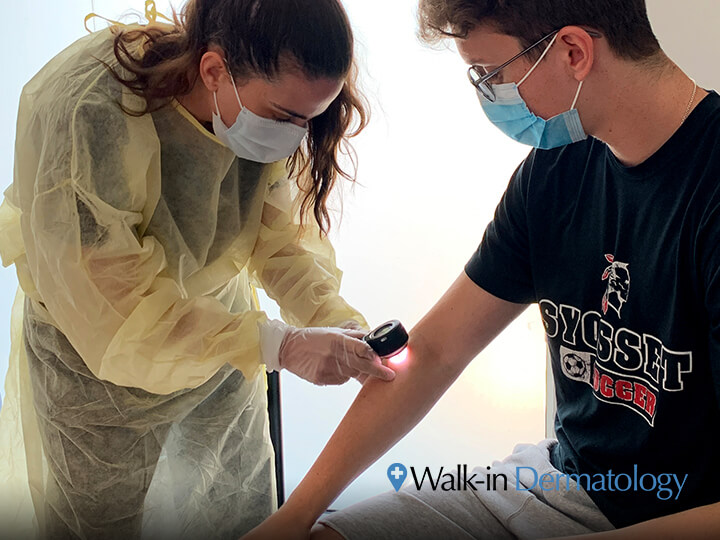Melbourne's Leading Chromaderm Dermatologist: Cutting-edge Skin Care at Its Best
Exploring the Duty of Skin Doctors in Detecting and Dealing With Varied Skin Problem With Precision
From usual issues like acne and dermatitis to much more intricate disorders such as cancer malignancy or unusual hereditary skin conditions, skin specialists are at the forefront of identifying and dealing with these conditions with precision. Past the surface of skin problems exist interconnected elements that affect medical diagnosis and treatment outcomes.
Significance of Early Detection
Early detection of skin problems plays a vital duty in the reliable treatment and administration by dermatologists. Skin specialists depend on their know-how to recognize subtle adjustments in the skin that may indicate underlying problems, such as skin cancer cells, dermatitis, dermatitis, or psoriasis.
Discovering skin cancer in its very early phases substantially improves the prognosis and raises the possibility of effective therapy results. Stressing the significance of early discovery emphasizes the vital duty that dermatologists play in advertising skin wellness and well-being.
Advanced Diagnostic Methods
Making use of state-of-the-art innovation and specific knowledge, skin specialists employ advanced diagnostic techniques to properly identify and evaluate various skin problem. Among the key devices in the skin specialist's analysis arsenal is dermoscopy, a non-invasive method that permits the assessment of skin structures not noticeable to the nude eye. By amplifying the skin, dermoscopy aids in the very early detection of cancer malignancy, basal cell carcinoma, and other skin cancers cells. Additionally, skin doctors may make use of confocal microscopy, a high-resolution imaging technique that enables them to imagine skin at a cellular level without the requirement for a biopsy. This innovation is especially practical in identifying inflammatory skin disease and tracking treatment effectiveness.
Additionally, molecular testing has reinvented the diagnosis and treatment of skin illness by enabling skin doctors to analyze hereditary mutations related to conditions such as cancer malignancy and genetic dermatoses. Via methods like polymerase chain reaction (PCR) and next-generation sequencing (NGS), skin doctors can supply individualized treatment strategies based upon an individual's specific hereditary profile. These innovative diagnostic devices enhance the accuracy and effectiveness of skin-related care, inevitably causing better outcomes for individuals.

Tailored Therapy Approaches
With a comprehensive understanding of skin conditions achieved via innovative analysis methods, skin specialists tailor treatment methods to address private patient needs properly. This tailored strategy is vital in guaranteeing optimal outcomes for people with varied skin conditions. By considering factors such as skin kind, medical history, lifestyle habits, and therapy preferences, dermatologists can develop therapy plans that are specifically customized per client.
Tailored therapy techniques may entail a mix of therapies such as topical drugs, oral drugs, minimally intrusive procedures, or way of living adjustments. Patients with acne may profit from a regimen that consists of topical retinoids, dental prescription antibiotics, and in-office treatments like chemical peels or laser therapy. On the various other hand, individuals with dermatitis may need a treatment plan concentrated on gentle skincare regimens, creams, visit topical corticosteroids, and determining and staying clear of triggers that intensify their problem.

Taking Care Of Persistent Skin Conditions
Skin doctors play a critical duty in establishing long-term monitoring techniques for chronic skin problems, guaranteeing effective treatment and improved high quality of life for individuals - Chromaderm Dermatologist. Managing chronic skin problem calls for an extensive strategy that surpasses simply dealing with signs. Skin doctors are trained to not just diagnose these problems accurately yet also to produce individualized treatment plans that resolve the underlying elements and reasons adding to the skin problem's persistence
In handling persistent skin disease, skin specialists often utilize a mix of treatment techniques customized per patient's particular demands. This may include topical medicines, dental medications, way of life adjustments, and step-by-step interventions such as laser therapy or phototherapy. Normal follow-up consultations are vital to keep an eye on the problem's progress, adjust treatment as required, and supply ongoing support and education to individuals.
In addition, dermatologists play a critical function in encouraging people to take an active role in managing their skin problem. By informing individuals regarding their condition, treatment options, and safety nets, skin specialists assist individuals make educated choices and grow healthy and balanced skin routines that add to long-term skin health and overall wellness.
Collaborative Care Approaches
In the holistic management of skin problem, joint treatment methods entailing numerous medical care experts are essential for maximizing person end results. Skin doctors often function in multidisciplinary groups to give thorough treatment that deals with the diverse demands of people with skin problem. By working together with medical care medical professionals, specialists, cosmetic surgeons, and other professionals, skin specialists can make sure that clients receive incorporated and worked with care tailored to their details problem.
Collaborative treatment techniques additionally encompass individual education and assistance. Skin specialists can work very closely with pharmacists, registered nurses, and psychologists to best site enlighten clients about their skin problem, treatment choices, and preventive procedures. This interdisciplinary approach equips people to actively take part in their care and make informed decisions concerning their health.
Additionally, joint treatment enables an extra alternative evaluation of people, thinking about learn the facts here now not only the physical symptoms of their skin problem but also the emotional and social influence it may have. By thinking about the more comprehensive implications of skin conditions, healthcare experts can create much more tailored therapy plans that address the distinct requirements of each person. Inevitably, collaborative care approaches play an important duty in supplying high-quality, patient-centered look after people with varied skin disease.
Conclusion
In final thought, dermatologists play a crucial role in detecting and dealing with a broad range of skin problems with precision. By handling persistent skin conditions and applying collective care techniques, skin specialists ensure effective and detailed care for their clients.
Dermatologists count on their competence to recognize refined changes in the skin that may indicate underlying troubles, such as skin cancer cells, dermatitis, psoriasis, or eczema. By multiplying the skin, dermoscopy aids in the very early discovery of melanoma, basic cell carcinoma, and other skin cancers cells.With an extensive understanding of skin problems achieved through innovative analysis strategies, dermatologists customize treatment strategies to resolve private client requires successfully. Skin doctors are trained to not only detect these problems accurately however likewise to develop customized treatment strategies that resolve the underlying aspects and reasons adding to the skin problem's persistence.
In managing persistent skin conditions, skin specialists commonly use a combination of treatment modalities tailored to each client's certain demands.